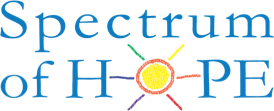Please note that Spectrum of Hope now offers diagnostic services and evaluations as part of a comprehensive intake package.
An Autism Spectrum Disorder diagnosis is required to participate in our programs. Spectrum of Hope is excited to be able to offer diagnostic services to families as part of the admissions process.
Autism is called a spectrum disorder because it manifests differently in every child, with a wide range of symptoms and severity, from mild, almost unnoticeable differences to severe developmental delays. If you start noticing differences in your child, learn more about potential symptoms and monitor their development.
If you suspect your child might have autism, talk to their doctor to discuss further testing, diagnosis and treatment plans that could help them navigate their differences.
What Is Autism?
Autism Spectrum Disorder, or ASD, is a developmental disorder characterized by its effects on communication, social skills, and behavior. Autism can impair language development, motor skills, social interaction, and emotional regulation. It frequently causes sensory processing difficulties, wherein people with ASD may feel over or under-stimulated by everyday situations.
Autism can also coincide with a host of health problems, such as allergies, an increased risk of psychiatric disorders, metabolic disorders, epilepsy, even gastrointestinal issues like constipation or diarrhea.

As many as 1 in 6 children have a developmental disability, with an estimated 1 in 54 children identified with ASD specifically. The causes of ASD remain unknown, but contemporary research points to genetic factors which disrupt brain development in early age. Many children with specific genetic disorders and mutations, such as Fragile X Syndrome, also experience much higher rates of ASD. ASD is also more common in children who are born prematurely.
One of the difficult aspects of determining if a child has ASD is its varied presentation. Dr. Stephen Shore coined the now-famous phrase, “If you’ve met one person with autism, you’ve met one person with autism.” There is no singular presentation of autism spectrum disorder, as ASD manifests differently in everyone.
The first signs of ASD can occur at different times in a child’s development. Studies show that “one-third to one-half of parents of children with an ASD noticed a problem before their child’s first birthday, and nearly 80%–90% saw problems by 24 months of age.” The CDC notes many of these “red flags” of possible autism spectrum disorder:
Social Signs:
- persistent avoidance of eye contact
- speaking in a monotone voice
- a lack of apparent interest in interaction with others
- a lack of emotional expression
- difficulties with understanding the emotions of others
- a misunderstanding of body language and social cues
- avoiding physical contact
Behavioral Signs:
- repetitive physical motions
- high sensitivity to physical and emotional stimuli (sensory processing issues)
- emotional and physical outbursts known as “meltdowns” in response to feeling over-stimulated
- intense focus or obsessive interest with a particular subject or object
- a strong reliance and attachment to a regular routine
Early Signs of ASD:
- not responding to one’s name
- delays in language development
- the loss of previously developed language or social skills (regression)
- verbal “echoing” where a child may repeat a phrase rather than answering a question or instruction
- not physically gesturing or not responding to the gesturing of others
Language Use Issues

Some children with autism may not develop the use of language. This is often referred to as nonverbal autism. Some prefer the term “pre-verbal” since some children with delayed speech later acquire the use of language. A child diagnosed with nonverbal autism at a young age may still be able to learn language with regular therapy and help.
Children with nonverbal autism may go on to use language fluently or they may learn to use language in a very limited way via simple phrases or yes-or-no answers to questions. Some may not learn to use language at all as they grow older. The outcomes of treatments for nonverbal autism vary by patient, the therapist, the types of therapies used, and other factors.
Similar and Co-Occurring Conditions
Because of its wide range of presentations, ASD can share symptoms with numerous other conditions. For instance, an anxiety disorder such as selective mutism can share some of the social symptoms of autism spectrum disorder. ASD can also occur alongside other conditions, which can complicate diagnosis and treatment. These can include Attention Deficit/Hyperactivity Disorder (ADHD), anxiety disorders, and depression.
The only way to know for sure is to seek evaluation by a medical or clinical professional, to be communicative, and to ask relevant questions about signs and symptoms your child may be experiencing.
Reasons to Get an Autism Diagnosis
As we’ve mentioned, every child with ASD experiences a unique set of symptoms with varying levels of severity. For children with mild symptoms, you may be considering getting an autism diagnosis and wondering how the diagnosis process could benefit your child.
Common advantages of an official autism diagnosis include:
- Access to support and services: Many autism support programs, therapies and services are only available to children with professional autism diagnoses. Getting your child diagnosed could open up important doors and allow them to get the support they need to thrive.
- Better self-understanding: Children with autism generally know there’s something different about them, but without a diagnosis, they may not have the tools to pinpoint what that is. A diagnosis could provide them with a better understanding of who they are and why they seem different from others.
- A community of like individuals: When children are diagnosed with autism, they often enter treatment programs and support groups. In these settings, they can meet other children who are like them, managing symptoms and experiencing the world in a similar way.
- Support for parents and caregivers: Raising a child with autism isn’t always easy, but when your child has a diagnosis, you can access more services and support to help you understand your child’s behavior. Many therapy programs for children with autism encourage parental involvement and give you the tools you need to help your child reach their full potential.
With an official autism diagnosis, you can enroll your child in our early learners program at Spectrum of Hope. In this program, you and your child will work with board-certified behavior analysts and therapists to develop a plan to begin managing your child’s behavior and developing essential life skills.
Our program provides support for children with autism and their parents and caretakers, giving you the tools to most effectively address your child’s needs.
Should I Have My Child Tested for Autism?
The above signs and symptoms are only some of the ways that autism can present. Parents may witness some of these behaviors in their child and wonder how they can know for sure whether ASD is the cause. In such a case, consultation with a medical professional is vital.
There is no single medical test that can reliably diagnose autism spectrum disorder. Instead, regular developmental checkups can determine if further evaluation is necessary. If you or your child’s pediatrician notice early signs of autism, your child’s developmental progress will be more closely monitored. Children who continue to exhibit the signs and symptoms of autism should be tested to confirm a diagnosis.
Your pediatrician can refer you to a trained specialist for a formal developmental evaluation and diagnostic test. The NIH notes that such evaluations usually involve a team of medical professionals from different fields, who coordinate their evaluations with specific neurological, cognitive and behavioral tests to determine whether ASD is present.
Diagnostic tests can confirm whether your child has autism or a different condition manifesting in similar symptoms that may require additional tests or treatments.
When Should My Child Be Tested for Autism?
The American Academy of Pediatrics recommends all children be screened for autism at their 18-month and 24-month well-child checkups. While you may notice signs of autism in your child as young as six months, professional testing and an official diagnosis likely won’t be available or accurate until they hit the 18-month mark.
You and your pediatrician should start monitoring your child’s development during well-child visits at 9 months, 18 months and 30 months, in addition to the ASD-specific screenings at 18 and 24 months. Additional autism screenings are recommended for children with a family history of autism, including siblings or close family members with autism diagnoses.
As a general rule, the sooner your child is officially diagnosed with autism, the sooner you can begin early intervention programs and therapies to help address their developmental gaps. Getting started as early as possible is the best way to ensure your child has the support they need to reach their full potential.
Keep in mind that every child with autism is different and displays symptoms uniquely. Some signs may not become apparent until your child is older. There’s no wrong age to get your child tested for autism if you begin to notice the signs.
How to Get Diagnosed With Autism as a Teenager
While most children are diagnosed with autism at a younger age, some experience more subtle signs that don’t begin to affect them until they reach puberty. During this time, their hormones shift, and you may start to see changes in their behaviors and emotions.
Puberty can also mark a major transition period, as they enter higher grade levels that emphasize critical thinking rather than memorization and where social relationships become more central to the teenage lifestyle. These changes can make symptoms of autism more apparent.
If you or your teenager suspect they may have autism, you should start by working together to make a list of the symptoms they are experiencing. Since most diagnostic tests focus on early childhood development, you’ll need to think back on their earlier years and see if there were any symptoms or developmental delays they may have faced. Take your lists to your teen’s pediatrician to discuss your concerns and get a referral for a professional test.
It’s important to note that children do not develop autism in their teens. ASD is something children are born with, with a wide range of symptoms that may be more or less pronounced at different stages of their lives. If you suspect your teen may have autism, you’ll likely be able to think back and notice symptoms from their early years as well.
Take the Next Step With Autism Treatment at Spectrum of Hope
An autism diagnosis can be frightening, saddening, and overwhelming for parents. Autism also does not occur exclusively in children. Some cases may not be apparent in childhood and may occur in adolescents and adults as well. There are a variety of important next steps to take once a diagnosis has been made, from communicating the diagnosis to family and friends, to seeking proper treatment. Learn more about our treatment programs and what you can do if you suspect your child has autism. Call (281)894-1423 to speak with a member of our team. If you’re ready to take the next step for an autism diagnosis, our team of experts can help schedule your diagnostic appointment.
